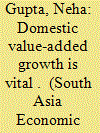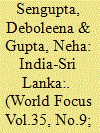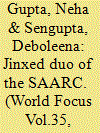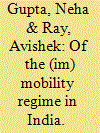|
|
|
Sort Order |
|
|
|
Items / Page
|
|
|
|
|
|
|
| Srl | Item |
| 1 |
ID:
147896


|
|
|
|
|
| Summary/Abstract |
Gains under the global value chains (GVCs) depend on how much of a country’s domestic value added (DVA) is passing onto other countries. However, India’s manufacturing sector is found to be hollowing out, that is, its DVA growth is declining. This article estimates the linkages of manufacturing sector into GVCs, focusing on machinery and textiles industries. It measures foreign value added in exports and gains under GVCs using intercountry input–output tables of OECD–WTO Trade in Value Added (TiVA) database (2015). TiVA shows a decline in India’s share of DVA exports in its gross exports. However, India has ‘net gains’ from linking into GVCs in the two industries as the ratio of forward linkages to backward linkages is greater than one. This indicates that value-added exports are greater than value-added imports. Thus, India has enough potential to compete with other countries in the upper ends of value chains in both its machinery and textiles industries.
|
|
|
|
|
|
|
|
|
|
|
|
|
|
|
|
| 2 |
ID:
133909


|
|
|
|
|
| Publication |
2014.
|
| Summary/Abstract |
India and Sri Lanka, the two very close neighbours, are separated by a narrow stretch of water called Palk Strait. The history and mythology of the two countries are inter- related and the social ties between the two is more than 2,500 years old and both sides have built upon a legacy of intellectual, cultural, religious and linguistic intercourse. Shortly following independence, the major tribulations bedevilling the rapport of both the countries were the question of citizenship of the persons of Indian Origin resident in Sri Lanka, the majority of who had migrated to the Island during the British Period to the Coffee and subsequently tea plantations.
|
|
|
|
|
|
|
|
|
|
|
|
|
|
|
|
| 3 |
ID:
135474


|
|
|
|
|
| Summary/Abstract |
In the present time, regional organizations like South Asian Association for Regional Cooperation (SAARC) are becoming an imperative and effectual new landscape for political and economic interaction in the world. SAARC is an organization comprising eight South Asian nations: Afghanistan, Bangladesh, Bhutan, India, Maldives, Nepal, Pakistan and Sri Lanka. It was established in 1985 by Bangladesh, Bhutan, India, Maldives, Nepal, Pakistan and Sri Lanka. Afghanistan joined SAARC in 2007.
|
|
|
|
|
|
|
|
|
|
|
|
|
|
|
|
| 4 |
ID:
130171


|
|
|
|
|
| Publication |
2014.
|
| Summary/Abstract |
Not all of Gandhi's principles may be relevant today, but most of them have universal, delicate and everlasting plea. If any part of the world would suffer from poverty, chaos, oppression, inequality and injustice, Gandhi's ethics and principles will constantly have its applicability and pertinence. Thus to survive in harmony and civil means Gandhi's ideals will always remain relevant.
|
|
|
|
|
|
|
|
|
|
|
|
|
|
|
|
| 5 |
ID:
180060


|
|
|
|
|
| Summary/Abstract |
In this paper, we examine how the Indian welfare-capitalist state, in responding to the pandemic in diverse ways, has appealed to the ‘guilt conscience’ and played on the vexed positionality of the mobile elite, who following the pandemic, have to give up their freedom of mobility. We argue that the very condition of political legibility of the mobile subject is predicated upon the ethico-moral ideal of the ‘good citizen’, who, in the statist imagination, ought to not only feel guilty but also compromise their civil liberties in questions of mobility. Under this quasi-medical dispensation, all mobilities become transgressive acts, while the implementation of the prevailing immobility regime depends more on the good citizen’s ethico-moral imperative than any discourses of legality or pathology.
|
|
|
|
|
|
|
|
|
|
|
|
|
|
|
|
|
|
|
|
|